- Home
- Lauren Oliver
Raven: A Delirium Short Story Page 4
Raven: A Delirium Short Story Read online
Page 4
“How’s Sarah?” I say. “Is she here?”
“Sarah stayed in Maryland,” Hunter says. “The homestead is thirty strong, and she won’t have to migrate. The resistance is trying to get word to her sister.”
“What about Grandpa and the others?” I am breathless, and there is a tight feeling in my chest, as though I am still being squeezed.
Bram and Hunter exchange a small glance.
“Grandpa didn’t make it,” Hunter says shortly. “We buried him outside Baltimore.”
Raven looks away, spits on the pavement.
Bram adds quickly, “The others are fine.” He reaches out and places a finger on my procedural scar, the one he helped me fake to initiate me into the resistance. “Looking good,” he says, and winks.
We decide to camp for the night. There’s clean water a short distance from the old mall, and a wreckage of houses and business offices that have yielded some usable supplies: a few cans of food still buried in the rubble; rusted tools; even a rifle, which Hunter found cradled in a pair of upturned deer hooves, under a mound of collapsed plaster. And one member of our group, Henley, a short, quiet woman with a long coil of gray hair, is running a fever. This will give her time to rest.
By the end of the day, an argument breaks out about where to go next.
“We could split up,” Raven says. She is squatting by the pit she has cleared for the fire, stoking the first, glowing splinters of flame with the charred end of a stick.
“The larger our group, the safer we are,” Tack argues. He has pulled off his fleece and is wearing only a T-shirt, so the ropy muscles of his arms are visible. The days have been warming slowly, and the woods coming to life. We can feel the spring coming, like an animal stirring lightly in its sleep, exhaling hot breath.
But it’s cold now, when the sun is low and the Wilds are swallowed by long purple shadows, when we are no longer moving.
“Lena,” Raven barks out. I’ve been staring at the beginnings of the fire, watching flame curl around the mass of pine needles, twigs, and brittle leaves. “Go check on the tents, okay? It’ll be dark soon.”
Raven has built the fire in a shallow gully that must once have been a stream, where it will be somewhat sheltered from the wind. She has avoided setting up camp too close to the mall and its haunted spaces; it looms above the tree line, all twisted black metal and empty eyes, like an alien spaceship run aground.
Up the embankment a dozen yards, Julian is helping set up the tents. He has his back to me. He, too, is wearing only a T-shirt. Just three days in the Wilds have already changed him. His hair is tangled, and a leaf is caught just behind his left ear. He looks skinnier, although he has not had time to lose weight. This is just the effect of being here, in the open, with salvaged, too-big clothing, surrounded by savage wilderness, a perpetual reminder of the fragility of our survival.
He is securing a rope to a tree, yanking it taut. Our tents are old and have been torn and patched repeatedly. They don’t stand on their own. They must be propped up and strung between trees and coaxed to life, like sails in the wind.
Gordo is hovering next to Julian, watching approvingly.
“Do you need any help?” I pause a few feet away.
Julian and Gordo turn around.
“Lena!” Julian’s face lights up, then immediately falls again as he realizes I don’t intend to come closer. I brought him here, with me, to this strange new place, and now I have nothing to give him.
“We’re okay,” Gordo says. His hair is bright red, and even though he’s no older than Tack, he has a beard that grows to the middle of his chest. “Just finishing up.”
Julian straightens and wipes his palms on the back of his jeans. He hesitates, then comes down the embankment toward me, tucking a strand of hair behind his ear. “It’s cold,” he says when he’s a few feet away. “You should go down to the fire.”
“I’m all right,” I say, but I put my hands into the arms of my wind breaker. The cold is inside me. Sitting next to the fire won’t help. “The tents look good.”
“Thanks. I think I’m getting the hang of it.” His smile doesn’t quite reach his eyes.
Three days: three days of strained conversation and silence. I know he is wondering what has changed, and whether it can be changed back. I know I’m hurting him. There are questions he is forcing himself not to ask, and things he is struggling not to say.
He is giving me time. He is patient, and gentle.
“You look pretty in this light,” he says.
“You must be going blind.” I intend it as a joke, but my voice sounds harsh in the thin air.
Julian shakes his head, frowning, and looks away. The leaf, a vivid yellow, is still tangled in his hair, behind his ear. In that moment, I’m desperate to reach out, remove it, and run my fingers through his hair and laugh with him about it. This is the Wilds, I’ll say. Did you ever imagine? And he’ll lace his fingers through mine and squeeze. He’ll say, What would I do without you?
But I can’t bring myself to move. “You have a leaf in your hair.”
“A what?” Julian looks startled, as though I’ve recalled him from a dream.
“A leaf. In your hair.”
Julian runs a hand impatiently through his hair. “Lena, I—”
Bang.
The sound of a rifle shot makes us both jump. Birds start out of the trees behind Julian, temporarily darkening the sky all at once, before dispersing into individual shapes. Someone says, “Damn.”
Dani and Alex emerge from the trees beyond the tents. Both of them have rifles slung across their shoulders.
Gordo straightens up.
“Deer?” he asks. The light is nearly all gone. Alex’s hair looks almost black.
“Too big for a deer,” Dani says. She is a large woman, broad across the shoulders with a wide, flat forehead and almond-eyes. She reminds me of Miyako, who died before we went south last winter. We burned her on a frigid day, just before the first snow.
“Bear?” Gordo asks.
“Might have been,” Dani replies shortly. Dani is harder-edged than Miyako was: She has let the Wilds whittle her down, carve her to steel.
“Did you hit it?” I ask, too eager, though I already know the answer. But I am willing Alex to look at me, to speak to me.
“Might have just clipped it,” Dani says. “Hard to tell. Not enough to stop it, though.”
Alex ex says nothing, doesn’t register my presence, even. He keeps walking, threading his way through the tents, past Julian and me, close enough that I imagine I can smell him—the old smell of grass and sun-dried wood, a Portland smell that makes me want to cry out, and bury my face in his chest, and inhale.
Then he is heading down the embankment as Raven’s voice floats up to us: “Dinner’s on. Eat up or miss out.”
“Come on.” Julian grazes my elbow with his fingertips. Gentle, patient.
My feet turn me, and move me down the embankment, toward the fire, which is now burning hot and strong; toward the boy who becomes shadow standing next to it, blotted out by the smoke. That is
what Alex is now: a shadow-boy, an illusion.
For three days he has not spoken to me or looked at me at all.
Hana
Want to know my deep, dark secret? In Sunday school, I used to cheat on the quizzes.
I could never get into The Book of Shhh, not even as a kid. The only section of the book that interested me at all was “Legends and Grievances,” which is full of folktales about the world before the cure. My favorite, the story of Solomon, goes like this:
Once upon a time, during the days of sickness, two women and an infant went before the king. Each woman claimed that the infant was hers. Both refused to give the child to the other woman and pleaded their cases passionately, each claiming that she would die of grief if the baby were not returned solely to her possession.
The king, whose name was Solomon, listened to both their speeches, and at last announced that he had a fair
solution.
“We will cut the baby in two,” he said, “and that way each of you will have a portion.”
The women agreed that this was just, and so the executioner was brought forward, and with his ax, he sliced the baby cleanly in two.
And the baby never cried, or so much as made a sound, and the mothers looked on, and afterward, for a thousand years, there was a spot of blood on the palace floor that could never be cleaned or diluted by any substance on earth. . . .
I must have belaiI must en only eight or nine when I read that passage for the first time, but it really struck me. For days I couldn’t get the image of that poor baby out of my head. I kept picturing it split open on the tile floor, like a butterfly pinned behind glass.
That’s what’s so great about the story. It’s real. What I mean is, even if it didn’t actually happen—and there’s debate about the Legends and Grievances section, and whether it’s historically accurate—it shows the world truthfully. I remember feeling just like that baby: torn apart by feeling, split in two, caught between loyalties and desires.
That’s how the diseased world is.
That’s how it was for me, before I was cured.
In exactly twenty-one days, I’ll be married.
My mother looks as though she might cry, and I almost hope that she will. I’ve seen her cry twice in my life: once when she broke her ankle and once last year, when she came outside and found that protesters had climbed the gate, and torn up our lawn, and pried her beautiful car into pieces.
In the end she says only, “You look lovely, Hana.” And then: “It’s a little too big in the waist, though.”
Mrs. Killegan—Call me Anne, she simpered, the first time we came for a fitting—circles me quietly, pinning and adjusting. She is tall, with faded blond hair and a pinched look, as though over the years she has accidentally ingested various pins and sewing needles. “You’re sure you want to go with the cap sleeves?”
“I’m sure,” I say, just as my mom says, “You think they look too young?”
Mrs. Killegan—Anne—gestures expressively with one long, bony hand. “The whole city will be watching,” she says.
“The whole country,” my mother corrects her.
“I like the sleeves,” I say, and I almost add, It’s my wedding. But that isn’t true anymore—not since the Incidents in January, and Mayor Hargrove’s death. My wedding belongs to the people now. That’s what everybody has been telling me for weeks. Yesterday we got a phone call from the National News Service, asking whether they could syndicate footage, or send in their own television crew to film the ceremony.
Now, more than ever, the country needs its symbols.
We are standing in front of a three-sided mirror. My mother’s frown is reflected from three different angles. “Mrs. Killegan’s right,” she says, touching my elbow. “Let’s see how it looks at three-quarters, okay?”
I know better than to argue. Three reflections nod simultaneously; three identical girls
But the girl in the mirror is not Hana Tate. She is Hana Hargrove, soon-to-be wife of the soon-to-be mayor, and a symbol of all that is right about the cured world.
A path and a road for everyone.
“Let me see what I have in the back,” Mrs. Killegan says. “We’ll slip you into a different style, just so you’ll have a comparison.” She slides across the worn gray carpet and disappears into the storeroom. Through the open door, I see dozens of dresses sheathed in plastic, dangling limply from garment racks.
My mother sighs. We’ve been here for two hours already, and I’m starting to feel like a scarecrow: stuffed and poked and stitched. My mother sits on a faded footstool next to the mirrors, holding her purse primly in her lap so it won’t touch the carpet.
Mrs. Killegan’s has always been the nicest wedding shop in Portland, but it, too, has clearly felt the lingering effects of the Incidents, and the security crackdowns the government implemented in their aftermath. Money is tighter for practically everybody, and it shows. One of the overhead bulbs is out, and the shop has a musty smell, as though it has not been cleaned recently. On one wall, a pattern of moisture has begun bubbling the wallpaper, and earlier I noticed a large brown stain on one of the striped settees. Mrs. Killegan caught me looking and casually tossed a shawl down to conceal it.
“You really do look lovely, Hana,” my mother says.
“Thank you,” I say. I know I look lovely. It might sound egotistical, but it’s the truth.
This, too, has changed since my cure. When I was uncured, even though people always told me I was pretty, I never felt it. But after the cure, a wall came down inside me. Now I see that yes, I am quite simply and inarguably beautiful.
I also no longer care.
“Here we are.” Mrs. Killegan reemerges from the back, holding several plastic-swathed gowns over her arm. I swallow a sigh, but not quickly enough. Mrs. Killegan places a hand on my arm. “Don’t worry, dear,” she says. “We’ll find the perfect dress. That’s what this is all about, isn’t it?”
I arrange my face into a smile, and the pretty girl in the mirror arranges her face with me. “Of course,” I say.
Perfect dress. Perfect match. A perfect lifetime of happiness.
Perfection is a promise, and a reassurance that we are not wrong.
Mrs. Killegan’s shop is in the Old Port, and as we emerge onto the street I inhale the familiar scents of dried seaweed and old wood. The dayyesacke=" is bright, but the wind is cold off the bay. Only a few boats are bobbing in the water, mostly fishing vessels or commercial rigs. From a distance, the scat-splattered wood moorings look like reeds growing out of the water.
The street is empty except for two regulators and Tony, our bodyguard. My parents decided to employ security services just after the Incidents, when Fred Hargrove’s father, the mayor, was killed, and it was decided that I should leave college and get married as soon as possible.
Now Tony comes everywhere with us. On his days off, he sends his brother, Rick, as a substitute. It took me a month to be able to distinguish between them. They both have thick, short necks and shiny bald heads. Neither of them speaks much, and when they do, they never have anything interesting to say.
That was one of my biggest fears about the cure: that the procedure would switch me off somehow, and inhibit my ability to think. But it’s the opposite. I think more clearly now. In some ways, I even feel things more clearly. I used to feel with a kind of feverishness; I was filled with panic and anxiety and competing desires. There were nights I could hardly sleep, days when I felt like my insides were trying to crawl out of my throat.
I was infected. Now the infection has gone.
Tony is leaning against the car. I wonder if he has been standing in that position for all three hours we’ve been in Mrs. Killegan’s. He straightens up as we approach, and opens the door for my mother.
“Thank you, Tony,” she says. “Was there any trouble?”
“No, ma’am.”
“Good.” She gets into the backseat, and I slide in after her. We’ve had this car for only two months—a replacement for the one that was vandalized—and just a few days after it arrived, my mom came out of the grocery store to find that someone had keyed the word PIG into the paint. Secretly, I think that my mom’s real motivation for hiring Tony was to protect the new car.
After Tony shuts the door, the world outside the tinted windows gets tinged a dark blue. He turns the radio to the NNS, the National News Service. The commentators’ voices are familiar and reassuring.
I lean my head back and watch the world begin to move. I have lived in Portland all my life and have memories of almost every street and every corner. But these, too, seem distant now, safely submerged in the past. A lifetime ago I used to sit on those picnic benches with Lena, luring seagulls with bread crumbs. We talked about flying. We talked about escape. It was kid stuff, like believing in unicorns and magic.
I never thought she would actually do it.
&nb
sp; My stomach cramps. I realize I haven’t eaten since breakfast. I must be hungry.
“Busy week,” my mother says.
“Yeah.”
“And don’t forget, the Post wants to interview you this afternoon.”
“I haven’t forgotten.”
“Now we just need to find you a dress for Fred’s inauguration, and we’ll be all set. Or did you decide to go with the yellow one we saw in Lava last week?”
“I’m not sure yet,” I say.
“What do you mean, you’re not sure? The inauguration’s in five days, Hana. Everyone will be looking at you.”
“The yellow one, then.”
“Of course, I have no idea what I’ll wear. . . .”
We’ve passed into the West End, our old neighborhood. Historically, the West End has been home to many of the higher-ups in the church and the medical field: priests of the Church of the New Order, government officials, doctors and researchers at the labs. That’s no doubt why it was targeted so heavily during the riots following the Incidents.
The riots were quelled quickly; there’s still much debate about whether the riots represented an actual movement or whether they were a result of misdirected anger and the passions we’re trying so hard to eradicate. Still, many people felt that the West End was too close to downtown, too close to some of the more troubled neighborhoods, where sympathizers and resisters are concealed. Many families, like ours, have moved off-peninsula now.
“Don’t forget, Hana, we’re supposed to speak with the caterers on Monday.”
“I know, I know.”
We take Danforth to Vaughan, our old street. I lean forward slightly, trying to catch a glimpse of our old house, but the Andersons’ evergreen conceals it almost entirely from view, and all I get is a flash of the green-gabled roof.
Our house, like the Andersons’ beside it and the Richards’ opposite, is empty and will probably remain so. Still, we see not a single for sale sign. No one can afford to buy. Fred says that the economic freeze will remain in place for at least a few years, until things begin to stabilize. For now, the government needs to reassert control. People need to be reminded of their place.

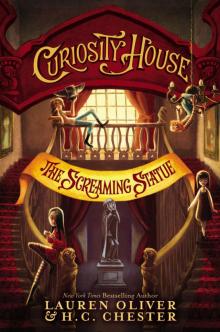 The Screaming Statue
The Screaming Statue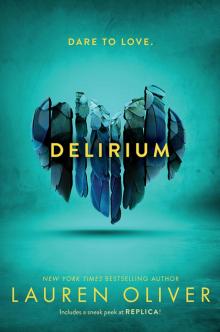 Delirium
Delirium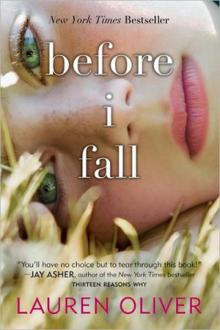 Before I Fall
Before I Fall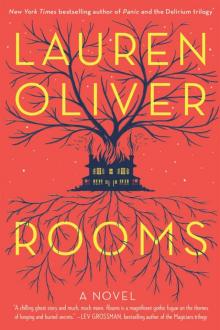 Rooms
Rooms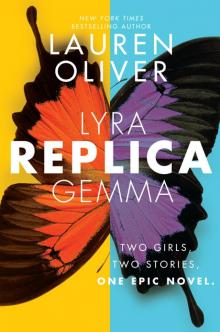 Replica
Replica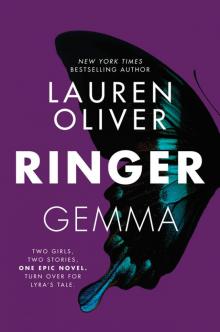 Ringer
Ringer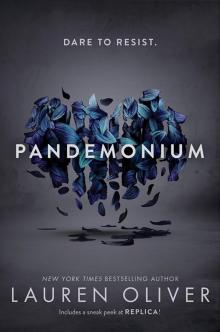 Pandemonium
Pandemonium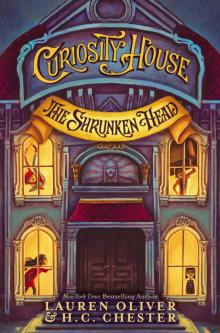 The Shrunken Head
The Shrunken Head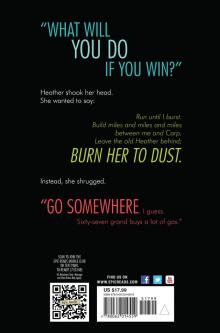 Panic
Panic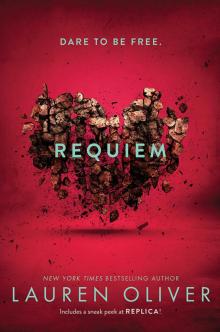 Requiem
Requiem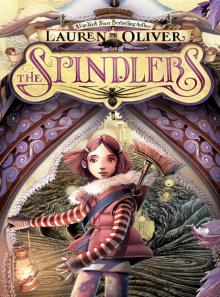 The Spindlers
The Spindlers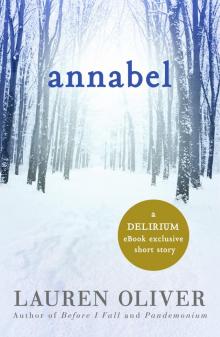 Annabel
Annabel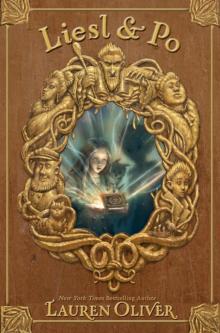 Liesl & Po
Liesl & Po Raven
Raven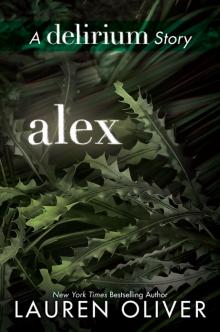 Alex
Alex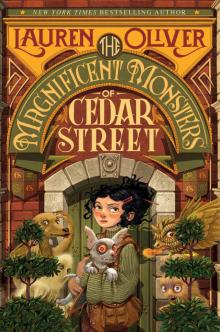 The Magnificent Monsters of Cedar Street
The Magnificent Monsters of Cedar Street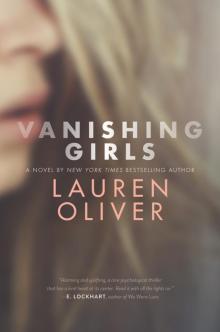 Vanishing Girls
Vanishing Girls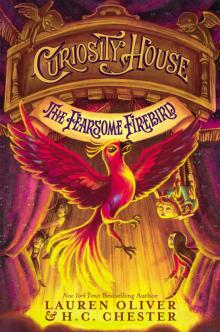 The Fearsome Firebird
The Fearsome Firebird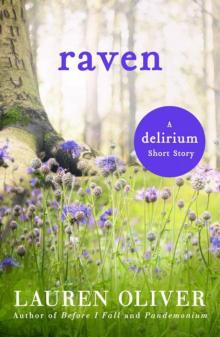 Raven: A Delirium Short Story
Raven: A Delirium Short Story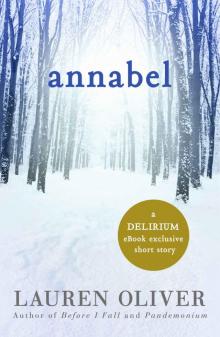 Annabel: A Delirium Short Story
Annabel: A Delirium Short Story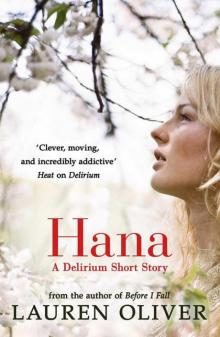 Hana: A Delirium Short Story
Hana: A Delirium Short Story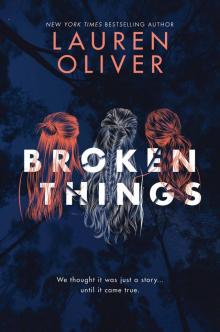 Broken Things
Broken Things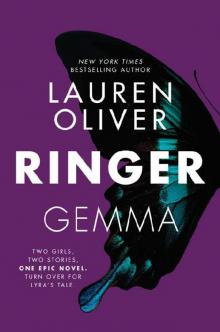 Ringer (Replica)
Ringer (Replica)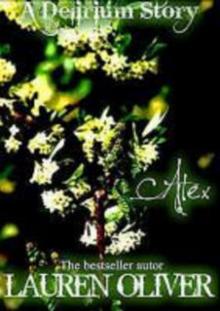 Alex (delirium)
Alex (delirium)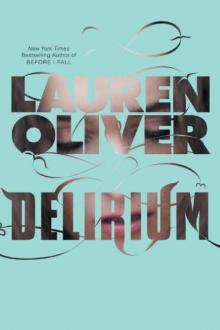 Delirium dt-1
Delirium dt-1